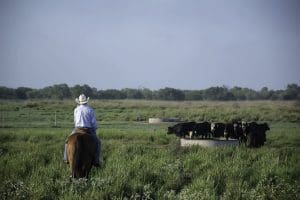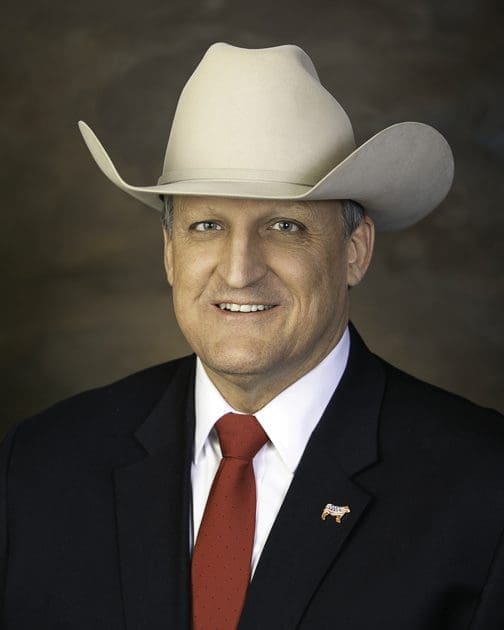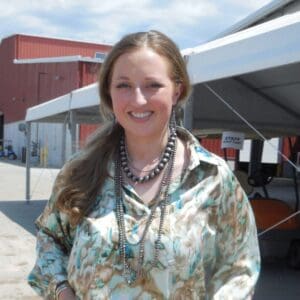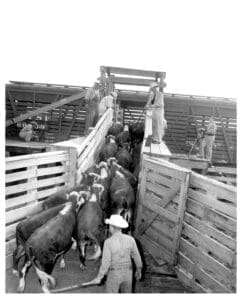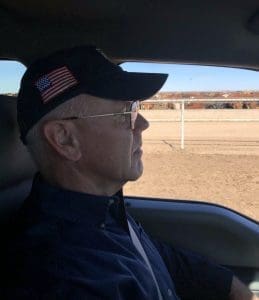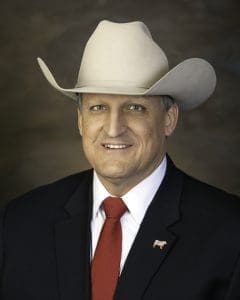
By Patti Wilson Contributing Editor
Todd Wilkinson can breathe a sigh of relief. After a busy year as National Cattlemen’s Beef Association (NCBA) president, he can sit down and rest. I spoke with him a few weeks prior to his handing over the reins and asked him what he considers are the biggest concerns cattlemen face.
Price Volatility
Wilkinson quickly asserts our biggest threat and daily burden is the price volatility cattle producers have been facing in the past months. The CME Feeder Cattle contract dropped $55 in the 80 days prior to our visit, a remarkable swing. The severe move makes risk management extremely difficult. He reminds us that this is not a new issue to livestock producers. Nonetheless, the moves are too big.
Fake Meat
A bigger problem in the long term is cell-cultured protein. Wilkinson spent time in the Netherlands in October 2023 when he attended the World Meat Congress where experts from across the globe shared eye-opening revelations. They included a warning that 20 percent of beef currently in the marketplace will be replaced by cell-cultured product in an aggressive time frame. Wilkinson warns there would be enormous ramifications for our industry if we lost that market share. Appropriate product labeling should be established now with the USDA and FSIS so the consumer can differentiate between conventional beef and cultured product. A prime example of poor labeling regulations entails milk and the dairy industry’s continual battle trying to establish labeling restrictions on items such as “almond milk,” “oat milk” and other alleged “milks” that are not milk at all. Wilkinson says the dairy battle is likely lost because the fake milks had a foot in the door before dairy could respond, making it too late to solve the problem. The meat sector needs to take a lesson and act immediately so the same thing doesn’t happen to us. Wilkinson predicts that cell-cultured meat may be in the U.S. market in two to four years; JBS has a plant in production in Spain and other businesses are ramping up in Europe. The cultured product will be considered an economically viable alternative for beef and pork, but chickens grow so fast that it won’t be profitable to culture poultry. He reminds us that the “media makes noise.” We don’t have inhumane treatment of animals and are already sustainable, but the media remains stacked against livestock production and provides us another hurdle to jump.
Animal Disease Traceability
USDA is currently advocating mandatory electronic identification (EID) for breeding and dairy cattle. Eventually, this will extend to all cattle. It would primarily be used to trace animals in the case of a foot and mouth disease (FMD) or tuberculosis outbreak, among other diseases. It is critically important for the future. Wilkinson says the information generated from widespread use of EIDs would not intrude on producers’ privacy. The people who see this information are health inspectors and veterinarians who are tracing livestock through data points to stop the spread of catastrophic diseases. He says it’s critical to have an EID system in place, although it is still voluntary. An FMD outbreak would shut down the entire United States for 72 hours, place restrictions on subsequent movement of livestock and severely affect our ability to export meat to foreign countries. These ramifications point to the need for efficient traceability.
“If you don’t want fluff, don’t approach.”
– Todd Wilkins
Animal Rights Activists
During his Holland excursion, Wilkinson saw firsthand how livestock producers are being hammered by animal rights and environmental activists. Holland is mandating severe cutbacks on nitrogen emissions. This would include possible runoff from fertilizers on farms, as well as urine from animals. Farmers are being forced to depopulate their livestock as a result. In addition, European animal rights activists are writing the rule book on livestock production, many of which have already been adopted by government regulatory agencies. Farmers must comply to stay in business. Meanwhile in the United States, animal rights groups have raised $600 million from donations prompted by TV commercials (think ASPCA’s sad dogs) and are lobbying for space in the Farm Bill. They are planning to dictate animal production methods in the United States like Europe has done. Currently, there are several ballot initiatives in progress, mainly in California and Colorado, that would restrict or eliminate livestock operations in various areas. The population base in states that are controlled by urban areas are at greatest risk. Wilkinson defends counties who maintain a legal “right to farm” status, saying they are effective in grandfathering in existing farms. If a county enacts restrictive regulations, a farmer has a better standing. It may not, however, protect people who wish to build a new hog unit or feedlot. He said some states have good protective laws on the books. Urbanites moving to the country, however, often have enough money to take agriculturalists to court. He said one of the downsides of capitalism allows wealthy folks to move from town and harass us.
Keep Your Head Up and Proceed
The past president says he makes a point to wear his cowboy hat wherever he travels. It’s a flag to urbanites who have questions about agriculture and provides an opportunity to be an advocate. He is glad to share that most folks have an appreciation for farmers and ranchers. They ask freely about the environment and any other topic connected to our living that comes to mind; people gravitate to cowboys. As for his travels, he says that people in the European Union look to us for help and advice. Wilkinson is co-owner and operator of a commercial cow-calf operation with his son, Nick, in De Smet, S.D. He is also a co-owner of Redstone Feeders, a family-owned cattle feeding and finishing operation. His last thought is a great one: “If you don’t want fluff, don’t approach.”
